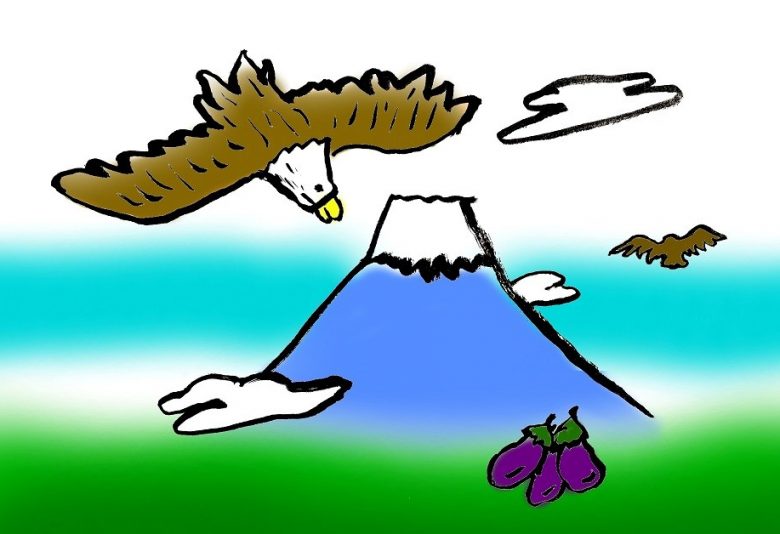
Hatsuyume: the first dream of the new year
There are many aspects of starting the New Year, and one of them is about getting ready to make our dreams come true. Whether it be traveling overseas, making friends from all around the world or learning a foreign language, the Japanese culture has a special auspicious indicator that you may be interested in knowing. We are talking about the “hatsuyume”, or first dream of the year. This tradition appears to date back to the early Edo Period, but even today, after about 400 years, many people continue to discuss its origins and actual meaning. Lets take a look at what this is about.

In the Japanese culture, it is said that if the first dream one has in the new year includes Mount Fuji, a hawk and an eggplant then it is certain that it shall be a great year for that person.
But why is that so? What does Mount Fuji, a hawk and an eggplant have to offer to make it an auspicious year? Here is where there is a lot of debate even until today.
One theory points out that, in regards to Mount Fuji, since it is the highest mountain in Japan, it resembles something as becoming number 1 or the biggest and most achieved. The hawk, being a clever and strong bird, doesn’t need much of an explanation itself. The eggplant however takes its meaning from a word play approach (as we have seen previously in our superstition chapters), where “nasu” (茄子), eggplant in Japanese, sounds the same as 成す, or to accomplish, achieve or succeed in something great.
But it doesn’t stop there. Others believe that the appearance of these 3 images are simply because they were the favorite things of shogun Tokugawa Ieyasu.
An even a more confusing theory, names this dream as “ichi-fuji, ni-taka, san-nasubi”, literally “one fuji, two hawk, three eggplant”. It appears that the order of appearance has an effect on the power of the goof luck, maybe? But the list continues from there, as “yon-sen, go-tabako, roku-zato”, literally “four fan, five tobacco and six a blind man”. Whichever may be the case, one thing is for sure, many people up to this day continue to have at least one of these images in their first dream of the year.

If you are really in desire to have this auspicious “hatsuyume”, there appears to be a technique to induce it. It is said that if one places an image of the seven deities of good fortune (“shichi fuku jin”, 七福神) on a boat loaded with treasures under your pillow, then you shall be calling this dream to happen. But here again a little distortion took place throughout the years, and another theory mentions just having an image of a large ship loaded with treasures and with the Chinese kanji character for treasure, 宝 (takara), written on its sail.

Many traditions and beliefs may change slightly throughout the years, but one thing that may not change is our ongoing dedication at SAKURA HOUSE to make your stay a successful experience, whether there is a lucky dream or not. So if you are looking to start preparing the foundations for your dream of coming to Japan to come true, having a secure and friendly place to stay is of vital importance. For this you can contact our multicultural team of experts to help you find the best Apartment, Share House or Guest House for a long or short term stay in Tokyo or Kyoto.
SAKURA HOUSE
Nishi-Shinjuku K-1 Bldg. 2F
7-2-6 Nishi-Shinjuku, Shinjuku-Ku Tokyo, Japan
Postal code: 160-0023
Google map
- From Japan:
- 03-5330-5250
- From outside Japan:
- +81-3-5330-5250
- Mail:
- [email protected]
- Office hours:
- 8:50 am to 8:00 pm
We are open every day of the year.
- Tokyo time:
- 10:36(We are open now!)







